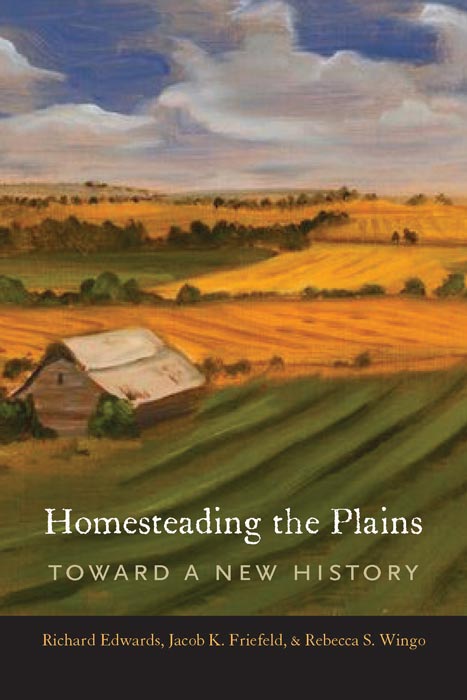 Homesteading the Plains Homesteading the Plains
Toward a New History
Richard Edwards, Jacob K. Friefeld and Rebecca S. Wingo2018 Nebraska Book Award; Choice Outstanding Academic Title Narrated by Bob Barton
Available from Audible
Book published by University of Nebraska Press
Homesteading the Plains offers a bold new look at the history of homesteading, overturning what for decades has been the orthodox scholarly view. The authors begin by noting the striking disparity between the public’s perception of homesteading as a cherished part of our national narrative and most scholars’ harshly negative and dismissive treatment.
Homesteading the Plains reexamines old data and draws from newly available digitized records to reassess the current interpretation’s four principal tenets: homesteading was a minor factor in farm formation, with most Western farmers purchasing their land; most homesteaders failed to prove up their claims; the homesteading process was rife with corruption and fraud; and homesteading caused Indian land dispossession. Using data instead of anecdotes and focusing mainly on the nineteenth century, Homesteading the Plains demonstrates that the first three tenets are wrong and the fourth only partially true. In short, the public’s perception of homesteading is perhaps more accurate than the one scholars have constructed.
Homesteading the Plains provides the basis for an understanding of homesteading that is startlingly different from current scholarly orthodoxy.
Richard Edwards
is the director of the Center for Great Plains Studies and professor of economics at the University of Nebraska–Lincoln. He is the author of numerous books including Natives of a Dry Place: Stories of Dakota before the Oil Boom.
Jacob K. Friefeld
has a PhD in history from the University of Nebraska–Lincoln, where he is also an instructor.
Rebecca S. Wingo
is a Mellon Postdoctoral Fellow in digital liberal arts at Macalester College.
REVIEWS:
“Homesteading the Plains is an important revisionist work—a must-read for those interested in the revitalization of historical interest in homesteading and the settlement of the Far West.”
—Western Historical Quarterly “Homesteading the Plains does an excellent job of providing reasons to be excited for the future of homesteading research while celebrating the past success of the Homestead Act, its principal role in the history of both the Great Plains and the entire country, and its enduring legacy on the land and the people who call it home.”
—Great Plains Quarterly “Homesteading the Plains is a provocative, well-informed, and strongly argued analysis of the role of homesteading in settling the Great Plains from 1863 to 1900.... Throughout the book the factual evidence is enriched by the stories of individual lives which are also embedded in the records. The result is a definitive analysis which is also a pleasure to read. It will serve as a model for future historians who want to circumvent the myths and find the facts about homesteading and its role in the development of the nation.”
—Nebraska History “Homesteading looms large in the folklore and memories of European settlement of the North American Great Plains, but has almost disappeared from professional research and writing, including mainstream US history textbooks. These three authors aim to revise the standardized views of homesteading.... Every library with any interest in frontier/western/Great Plains history should have a copy of this book.”
—CHOICE “A welcome contribution to the understanding of our region."”
—Omaha World-Herald “Recommended for all plains folk who like to brandish their homestead certificates, or who just share a tie to the land.”
—Prairie Public News “Homesteading the Plains represents an exciting new starting point for studying the Homestead Act's impact on agricultural expansion.”
—Kansas History “Homesteading the Plains in an important book. The authors apply new tools and innovative techniques to an old, nearly moribund topic. A regeneration of the field should certainly follow. Anyone interested in the history of the Great Plains will benefit from this exciting research.”
—Annals of Iowa “Even though Edwards, Friefeld, and Wingo have successfully revived homesteading history, their greatest achievement is in contributing to the historical field in general. They demonstrate that large, burdensome record groups such as the General Land Office files at NARA should not be ignored. Instead, pairing them with powerful, new technologies such as GIS not only provides a new method to reexamine old assumptions, but can also lead to new questions for historians to explore.... With a wealth of information being made available through nationwide digitization efforts, vast possibilities for continued research remain. For anyone concerned about the future of homesteading history, have no fear; it is alive and well.”
—Annals of Wyoming
|

